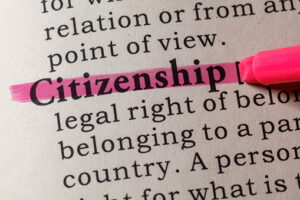 Lately, the news is filled with stories of people like Peter Sean Brown: Brown, born in Philadelphia and a resident of Florida, was detained after violating probation and told that he would be deported to Jamaica. The sheriff’s office insisted that Brown was not a citizen despite documentary evidence to the contrary, and despite Brown’s insistence that he was a citizen. His story eventually had a happy ending – he was in fact an American citizen and could prove it – but is it possible to be a citizen and not even know it? Is it possible to be a citizen even if you’re born outside the United States? Thanks to a couple of nuances in immigration law, it is.
Lately, the news is filled with stories of people like Peter Sean Brown: Brown, born in Philadelphia and a resident of Florida, was detained after violating probation and told that he would be deported to Jamaica. The sheriff’s office insisted that Brown was not a citizen despite documentary evidence to the contrary, and despite Brown’s insistence that he was a citizen. His story eventually had a happy ending – he was in fact an American citizen and could prove it – but is it possible to be a citizen and not even know it? Is it possible to be a citizen even if you’re born outside the United States? Thanks to a couple of nuances in immigration law, it is.
Children of Naturalized Citizens
The Child Citizenship Act of 2000 grants citizenship in one way that might be overlooked or misunderstood. The Act, which was incorporated into the Immigration and Naturalization Act (“INA”), affords citizenship to children born to U.S. citizens. Those children don’t have to be born in the United States to enjoy the advantages of citizenship; in fact, the children’s parents need not be born in the United States. Section 322 of the Act provides that if a person becomes a naturalized citizen of the United States, that person’s minor child (under the age of 18) also automatically becomes a citizen of the United States, as long as the child has been admitted to the United States as a Lawful Permanent Resident and is living in the United States in the legal and physical custody of the parent who holds citizenship. Children who met those requirements on the date the Act became effective (February 27, 2001) automatically became U.S. citizens.
A child who acquires U.S. citizenship under the Child Citizenship Act (CCA) can obtain proof of his or her citizenship by either applying for a Certificate of Citizenship from USCIS or submitting a passport application at any U.S. post office. In either case, the application must include the child’s birth certificate, his or her parent(s)’ proof of U.S. citizenship, evidence of the child’s permanent residence status (including Permanent Resident Card/Green Card or a foreign passport with the original I-551 visa entry stamp), parents’ marriage certificate, or proof of the citizen parent’s legal custody of the child prior to his or her 18th birthday. Each case is different, so the evidence required may differ slightly from case to case, depending on the circumstances of the child’s birth. An experienced immigration attorney can assist you if you feel that you may have acquired citizenship at birth through a U.S. citizen parent.
Children Born Abroad to U.S. Citizens
The INA also affords other routes to citizenship. Section 301(g) says that if a child is born outside the United States to a U.S. citizen and a foreign national, that child is a U.S. citizen if the citizen-parent was present in the U.S. for at least five years — two of those years after the age of 14 — before the child was born. To establish citizenship under Sec. 301(g), the U.S. citizen-parent of a foreign-born child should make a report of the birth to the U.S. Consulate in the child’s birth country, while simultaneously submitting a passport application at that U.S. consulate office. Supporting documentation for that application must include the child’s foreign birth certificate showing the U.S. citizen-parent as mother or father, evidence of that parent’s U.S. citizenship, the child’s parents’ marriage certificate, if applicable, and proof of the U.S. citizen-parent’s physical presence in the United States and abroad before the child’s birth to establish that the 5-year time period (2 after age 14) is met.
In some cases, when a parent is unable to show the required physical presence in the United States to impart citizenship to his or her child, a grandparent’s physical presence may be used to bridge the gap.
U.S. immigration law is a complex set of rules and requirements, and eligibility for certain benefits can be proved or lost with the smallest details of a particular person’s story. If you think you may have acquired or derived U.S. citizenship through a parent, make an appointment to discuss your case with an immigration attorney today. You may be pleasantly surprised with what you find out!
Kathleen Davies is a Staff Writer for GetLegal.com. She is a graduate of the University of Michigan Law School and has practiced law and taught legal writing and advocacy.
